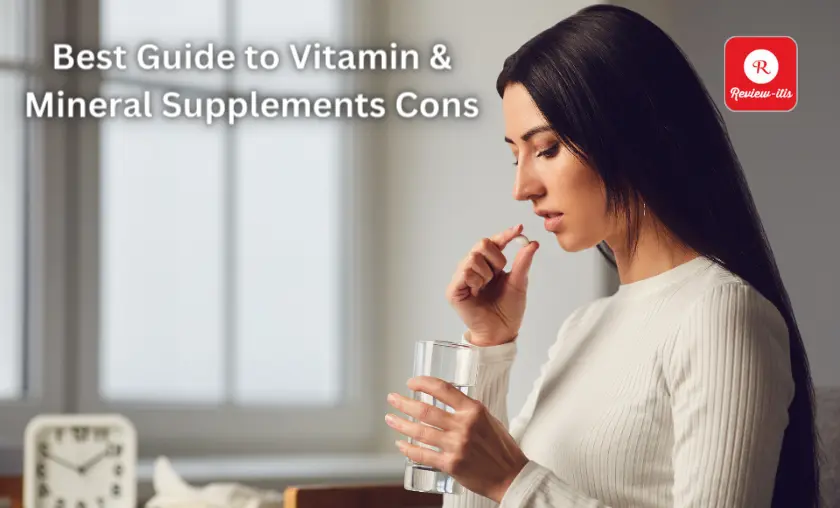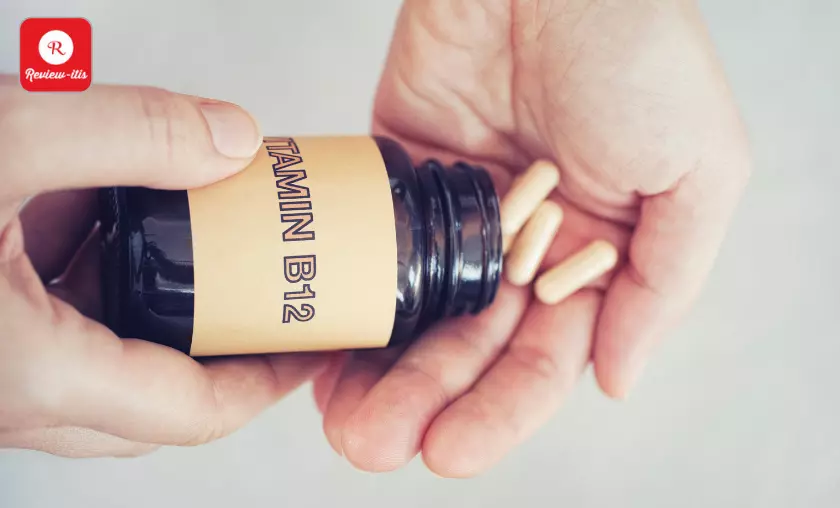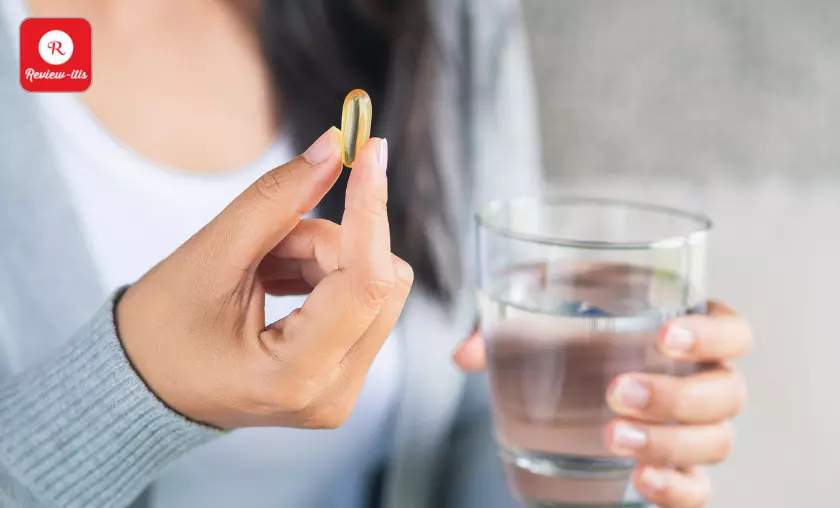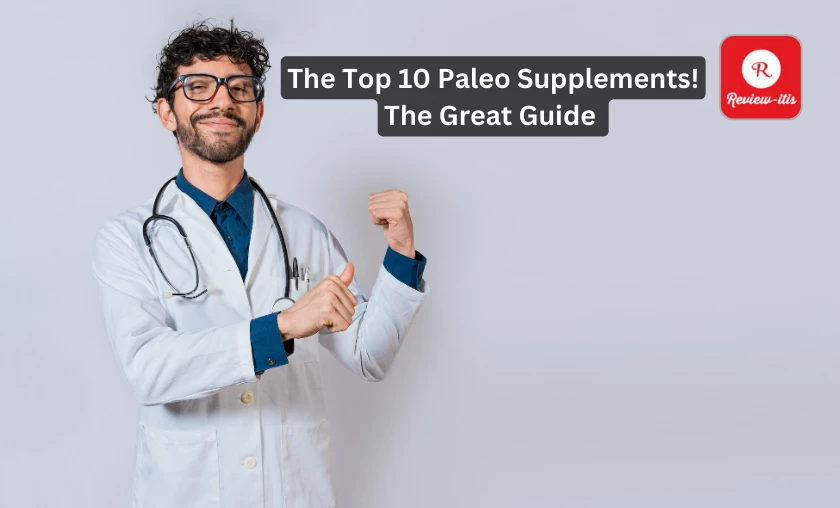
Welcome to “Best Guide to Vitamin and Mineral Supplements Cons.” In today’s age of health consciousness, supplements often surface in discussions about optimal nutrition. Many people turn to these supplements to boost their health and well-being. However, it is crucial to approach them with caution and a thorough understanding of their benefits and limitations.
In this guide, we’ll explore the role of vitamin and mineral supplements, shedding light on important considerations, potential risks, and the best practices for incorporating them into a balanced lifestyle. By gaining a comprehensive understanding, we can make informed choices that support our overall health and optimize the benefits of these supplements.
Table of Contents
So, let’s take off on this journey to discover the truth behind vitamin and mineral supplements!
About Vitamin and Mineral Supplements

Vitamins, those little organic compounds, are truly fascinating. Our bodies crave them, but only in minuscule amounts, for their role in countless metabolic processes. Obtaining these vital nutrients is always a good idea by consuming a diverse range of unprocessed, wholesome foods.
Now, let’s talk about those tempting vitamin and mineral supplements. While they may seem like a convenient insurance policy for those with limited dietary options, my friends, relying solely on these substitutes instead of embracing a nutritious diet is not advisable.
Sadly, it’s quite common to see these supplements being misused and abused without seeking proper professional guidance. Some folks treat them like magic pills, hoping they’ll cure their colds or magically wipe away their stresses. But alas, vitamins are not miraculous elixirs or medicinal wonders. They lend a helping hand in our metabolic functions.
And let me debunk a misconception for you: vitamins are not equivalent to drugs. They may have their merits, but taking excessively high doses of these supplements without medical advice is a definite no-no. So please, exercise caution and consult a healthcare professional before going down that road.
Vitamins & Minerals Are Obtained From Food

Research has given us some fascinating insights, suggesting that the vitamins you naturally acquire from food pack a bigger punch compared to their pill counterparts. It’s like they have a secret power that doesn’t translate into supplements.
Now, here’s an exception worth noting: folate. When it comes to this essential nutrient, the synthetic form found in supplements or fortified foods actually gets absorbed better by our bodies than the folate naturally present in food sources.
Food, my friends, is a beautiful medley of vitamins, minerals, and those fancy phytochemicals, also known as plant chemicals. They all team up together, working their magic. But supplements? They tend to go solo. Research hints that certain components in food might have different effects when taken in isolation as supplements. You see, the vitamins and minerals in food dance with other elements, not just the so-called “active ingredient.”
Speaking of phytochemicals, they’re quite the heroes. They play a vital role in reducing the risk of heart disease & certain types of cancers. But guess what? Supplements miss out on these incredible benefits and the countless other goodies found in food. So, my friends, popping vitamin and mineral supplements won’t make up for a healthy, balanced diet. They’re no match for the real deal!
Vitamin & Mineral Deficiencies

Our magnificent bodies are quite content with just a tiny dose of vitamins and minerals on a daily basis. And guess what? A well-rounded diet typically covers all our nutrient bases, ensuring we get an ample supply of each vitamin and mineral. However, there are situations where some individuals might need a boost in the form of supplements to address specific deficiencies. Let’s take a closer look at who falls into this category:
- People who smoke, drink alcohol in excess or use illegal drugs.
- The elderly (especially those who are disabled or chronically ill)
- Pregnant women and women who are breastfeeding
- Crash dieters or those on very strict diets
- People with food allergies
- Some vegetarians or vegans
- Women with heavy periods
- Those with malabsorption problems (such as diarrhea, coeliac disease, cystic fibrosis, or pancreatitis).
Folate & Pregnancy

Ladies, You’re advised to consider taking folic acid supplements, also known as folate, to lower the risk of your precious bundle of joy developing a neural tube defect like spina bifida. We want to give those little ones the best possible chance at a healthy start in life!
Folic acid is a neat B-group vitamin that can also be found in certain fortified foods like pieces of bread and breakfast cereals. You know what’s fascinating? Some smarty-pants folks add this essential nutrient to these foods during their production, boosting their nutritional value in the process. It’s like giving them a little extra nutritional oomph!
So, my dear ladies, considering folic acid supplements can be a wise move if you’re expecting or planning for the miracle of motherhood. And hey, keep an eye out for those fortified foods too. Let’s nourish ourselves and our future little ones with all the goodness we can!
Vegan Diets & Vitamin Supplements

If you’ve chosen to embrace a vegan lifestyle, especially during the precious journey of pregnancy, here’s a little nugget of wisdom for you: consider incorporating vitamin B12 supplements into your routine. Why, you ask? Well, it’s all about ensuring you get the proper dose of this essential nutrient to support your well-being and that of your little one.
You see, vitamin B12 is predominantly found in animal-based foods, which are not part of the vegan menu. So, to make sure you’re getting all the necessary goods, these supplements can be your trusty sidekick. My dear vegan warriors, we want to ensure you maintain optimal health while following your chosen dietary path.
So, to all the marvelous individuals on vegan journeys, particularly those who are expecting a little bundle of joy, consider adding vitamin B12 supplements to your daily routine. Let’s keep that vitality and nourishment flowing for a vibrant and thriving lifestyle!
Vitamin Pills Are Not Miracle Cures

Taking massive amounts of vitamins can work wonders in treating or preventing various ailments. Take, for example, the notion of vitamin C being hailed as a cure for the common cold or vitamin E being widely promoted as an antioxidant powerhouse to fend off heart disease.
Here’s the truth, my friends: Extensive research has been conducted, and these claims don’t hold up. Large-scale studies consistently reveal minimal benefits in consuming mega-doses of supplements. In fact, some evidence suggests that taking high-dose supplements intending to prevent or cure major chronic diseases, such as heart disease and cancer, may be detrimental to your health.
It’s important to approach these claims with caution and rely on the wealth of scientific evidence. While vitamins do play a vital role in our well-being, overdosing on supplements might not be the magic bullet we once thought it to be. So, let’s strive for a balanced approach and consult with healthcare professionals to make informed decisions about our health and the supplements we choose to incorporate into our lives.
Vitamin Use & Cancer Claims

Claims have been made about certain vitamins treating various cancers, but research reveals otherwise. Let’s take a closer look:
- IN HIGH DOSES, vitamin A (beta-carotene) does not cure cancer and can be toxic, especially when taken in pill form. In fact, studies have linked vitamin A to an increased risk of other cancers, such as lung cancer in smokers when consumed as a supplement.
- As for vitamin E, while some evidence suggests a potential role in preventing certain cancers, there is also evidence that it may accelerate the development of other types of cancer. However, this remains unproven.
- High doses of antioxidants are unlikely to enhance the effectiveness of conventional cancer treatments like chemotherapy and radiotherapy. In fact, mega doses of antioxidants can interfere with these treatments by safeguarding the cancer cells that these therapies aim to eliminate.
- Several studies indicate that high-dose supplements containing vitamins E or C or selenium do not decrease the risk of prostate, breast, or lung cancer.
Vitamin and Mineral Supplements Can Be Dangerous

Supplementation can lead to consuming large doses of a single vitamin in isolation. In contrast, when vitamins are obtained from food, they have a multitude of companions that assist in their absorption and utilization. For instance, food provitamin A (beta-carotene) is accompanied by numerous other carotenoids.
It’s important to recognize that simply taking a vitamin pill won’t instantly solve feelings of fatigue or lack of energy. The protective effects we receive from food are the result of a combination of various compounds, many of which we may not even be aware of. Removing one of these compounds and providing it in isolation may not be as effective and, in some cases, can even have negative effects.
Vitamin & mineral supplements can also interfere with prescription medications and medical treatments. In extreme situations, such as when individuals consume 100 times the recommended dietary intake (RDI), the efficacy of anticonvulsant drugs used in epilepsy treatment can be compromised.
High Doses of Vitamin Supplements Are Unsafe

Many individuals believe that if a small amount of vitamins is beneficial, a larger amount must be even more advantageous. However, it is crucial to understand and embrace the principle of ‘less is more.’
Exceeding the recommended doses of certain vitamins can lead to health problems. Here are some examples:
- Vitamins A, D, E, and K: These fat-soluble vitamins can accumulate in the body & become toxic when consumed in high doses.
- Vitamin B6: Even water-soluble vitamins like B6 can become toxic if taken in excessive amounts.
- Folate: Consuming excessive folate can mask vitamin B12 deficiencies essential for proper health.
- Vitamin B6: High levels of this vitamin have been associated with certain nerve damage.
- Vitamin C: Doses exceeding one gram can cause diarrhea and other discomforts like nausea, abdominal cramps, headaches, fatigue, and even kidney stones. Moreover, excessive vitamin C can interfere with the metabolism of other nutrients, such as dangerously raising iron levels.
- Vitamin C: An excess of this vitamin can also disrupt medical tests, leading to false results in tests such as diabetes screenings.
- Vitamin A: High doses of vitamin A may result in birth defects, as well as disorders affecting the central nervous system, liver, bones, and skin.
- Vitamin E: Taking high-dose vitamin E supplements has been linked to higher rates of early mortality.
To safeguard your well-being, it’s crucial to adhere to recommended dosage guidelines for vitamins and seek guidance from healthcare professionals. Remember, maintaining a balanced and moderate approach to vitamin intake is key to promoting overall health and avoiding potential complications.
Stay Safe & Keep to the Recommended Dose
In general, for a healthy adult considering supplements, it is advisable to adhere to levels close to the Recommended Daily Intake (RDI). Taking high-dose supplements should be avoided unless specifically recommended by a healthcare professional. It is important to prioritize your health and well-being by seeking appropriate medical advice before considering higher doses of supplements.
Vitamin & Mineral Supplements Are a Short-term Measure

Using vitamin and mineral supplements should be seen as a temporary solution. Prolonged use of high-dose supplements can result in symptoms of toxicity over time.
If you suspect that you may have deficiencies in certain vitamins and minerals, it is advisable to consider making dietary and lifestyle changes rather than relying solely on supplements. Seeking guidance from a doctor or a registered dietitian can provide valuable assistance in this regard. They can offer personalized recommendations to help address your specific needs and ensure a balanced approach to your nutritional requirements.
Seek Professional Advice When Taking Vitamin and Mineral Supplements

Certain complementary medicines, including vitamin and mineral supplements, have the potential to interact with prescription medicines and medical treatments. Therefore, it is crucial to consult your doctor for guidance and advice.
If your doctor recommends taking vitamin supplements, it is beneficial to consult a registered dietitian. They can collaborate with your healthcare team to provide tailored dietary recommendations that align with your specific needs. Regarding supplements, opting for multivitamins at the recommended dietary level is preferable over single-nutrient supplements or high-dose multivitamins.
During your visits, remember to inform any healthcare professional about your complementary medicines, including vitamin and mineral supplements. This ensures they have a comprehensive understanding of your healthcare regimen.
Conclusion
Regarding vitamin and mineral supplements, it is crucial to approach them with a balanced and informed perspective. While supplements can play a role in addressing specific deficiencies, they should not be seen as a substitute for a healthy & varied diet.
It is important to prioritize obtaining essential nutrients through wholesome, unprocessed foods whenever possible. Consulting with healthcare professionals, such as doctors and dietitians, can provide valuable guidance on supplementation, ensuring it is used appropriately and in conjunction with other treatments.
By staying informed and seeking professional advice, we can confidently navigate the world of vitamin and mineral supplements and make choices that best support our overall health and well-being.
FAQs
Are Vitamin and Mineral Supplements Necessary if I Have a Balanced Diet?
While a balanced diet generally provides adequate amounts of essential vitamins and minerals, certain individuals may have specific nutritional needs or restrictions that require supplementation.
Factors such as age, pregnancy, medical conditions, or dietary restrictions (e.g., veganism) may necessitate the use of supplements. It’s best to consult with a healthcare professional to determine if supplementation is necessary for you.
Can I Rely Solely on Supplements for My Nutritional Needs?
Supplements shouldn’t replace a healthy and varied diet. Whole foods offer a multitude of nutrients, including phytochemicals and other beneficial compounds that work synergistically to support optimal health.
While supplements can fill nutrient gaps, they should be seen as a complement to a nutritious diet rather than a substitute.
Are There Risks Associated With Taking Vitamin and Mineral Supplements?
Yes, there can be risks associated with the improper use of supplements. Taking excessive amounts of certain vitamins and minerals, especially fat-soluble ones like vitamins A, D, E, and K, can lead to toxicity.
Additionally, supplements can interact with prescription medications, potentially affecting their efficacy. Following recommended dosage guidelines and consult with a healthcare professional before starting any new supplements is crucial.
How Do I Choose a Quality Vitamin and Mineral Supplement?
Selecting a high-quality supplement can be challenging due to the vast array of products available. Look for reputable brands that adhere to strict manufacturing standards, such as third-party testing for purity and potency.
Additionally, check for certifications like the USP Verified Mark or NSF International certification, which ensure quality and safety.
Can Vitamin and Mineral Supplements Prevent or Cure Chronic Diseases?
While some supplements may have potential benefits in reducing the risk of certain diseases, they are not a guaranteed cure. Vitamin and mineral supplements should not be relied upon as a sole preventive measure or treatment for chronic conditions.
Adopting a holistic approach to health is essential, incorporating a balanced diet, regular exercise, stress management, and medical advice.
To read more similar articles, click here.
Thanks for visiting our Website. If you appreciate our work, kindly show us some support in our comments section 🙂





